The Legal and Ethical Challenges Faced by Cambridge Analytica
VerifiedAdded on 2023/01/11
|11
|3921
|23
AI Summary
This report assesses the case study of Cambridge Analytica, a political consulting firm that was found to be in breach of major legal and ethical laws while providing services to Mr. Donald Trump during the 2016 Presidential Elections of United States of America.
Contribute Materials
Your contribution can guide someone’s learning journey. Share your
documents today.
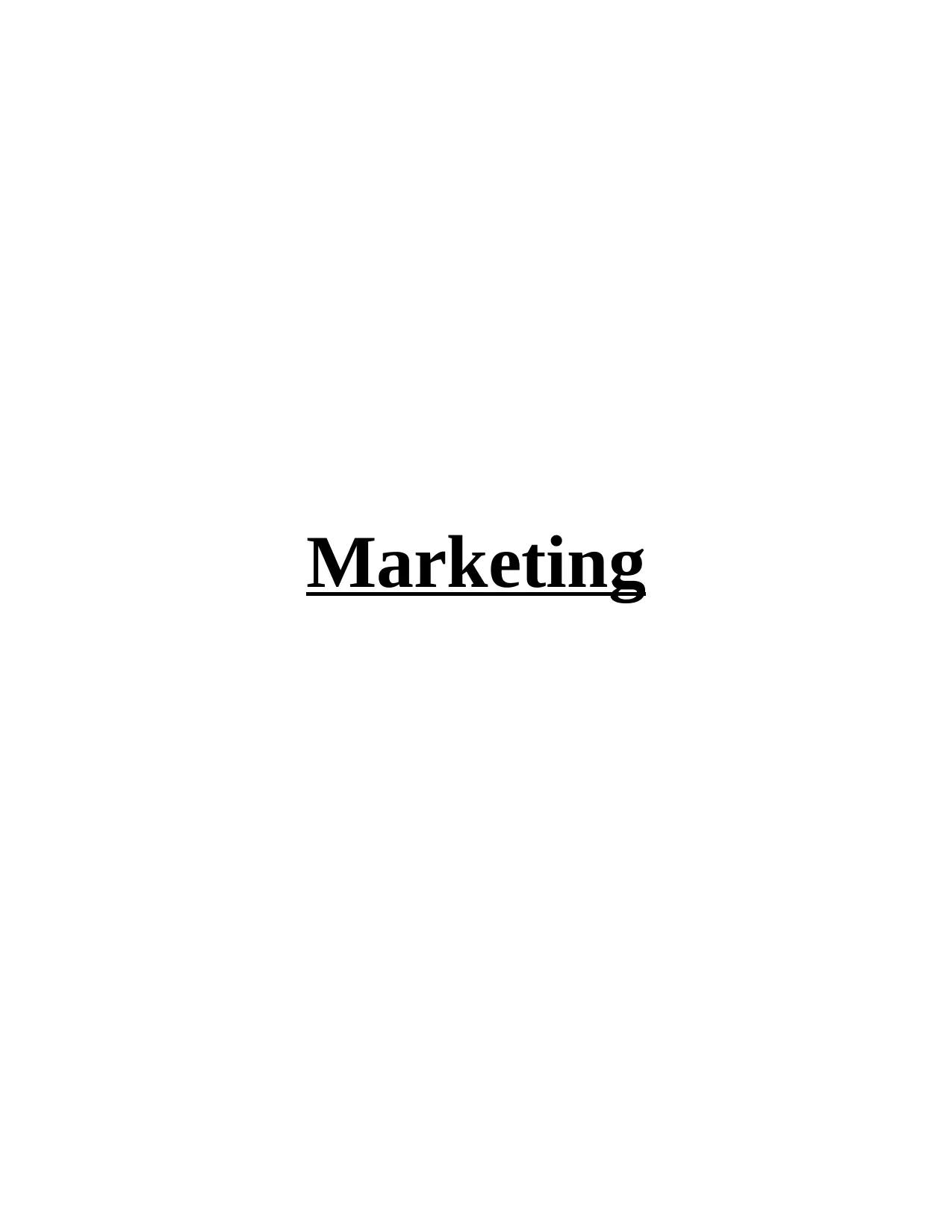
Marketing
Secure Best Marks with AI Grader
Need help grading? Try our AI Grader for instant feedback on your assignments.
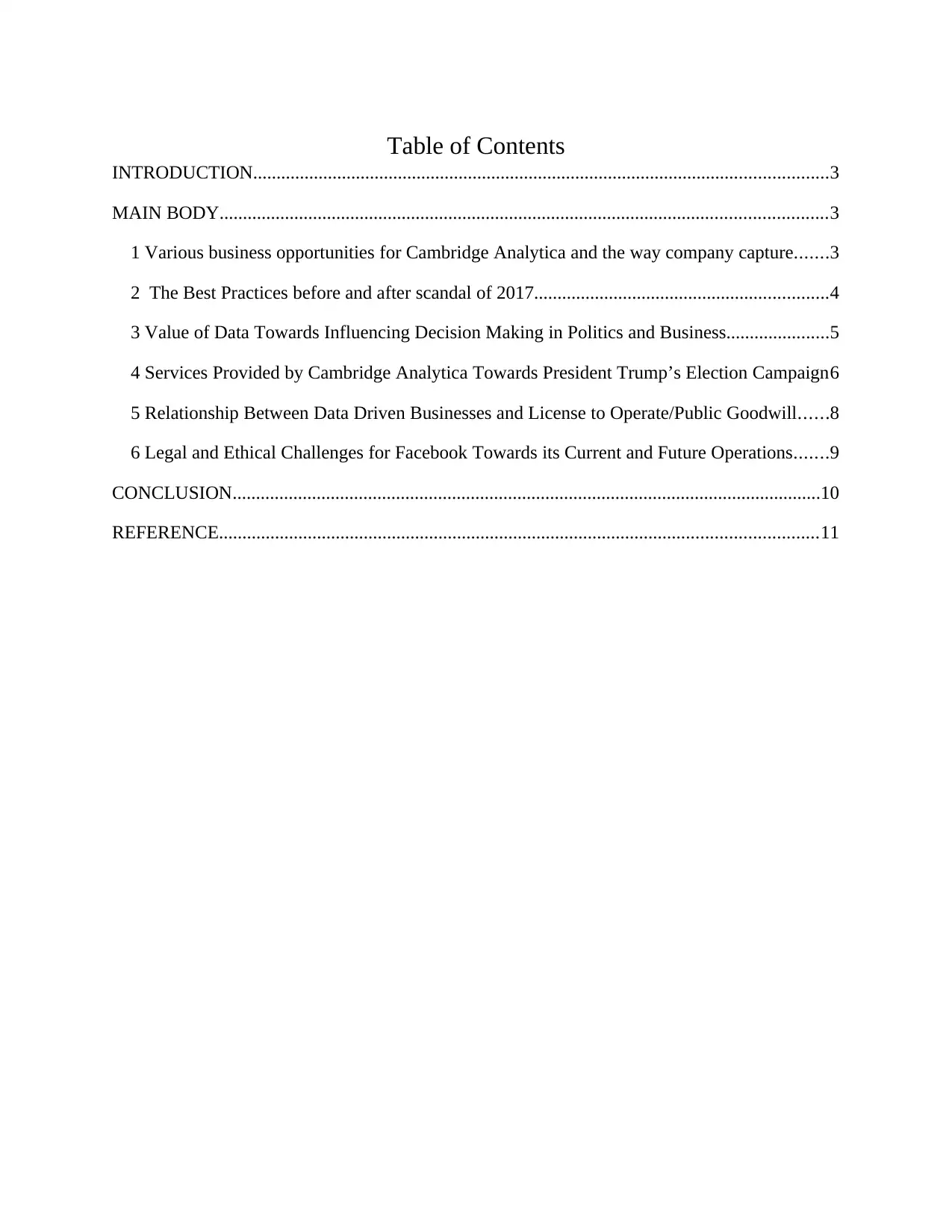
Table of Contents
INTRODUCTION...........................................................................................................................3
MAIN BODY..................................................................................................................................3
1 Various business opportunities for Cambridge Analytica and the way company capture.......3
2 The Best Practices before and after scandal of 2017...............................................................4
3 Value of Data Towards Influencing Decision Making in Politics and Business......................5
4 Services Provided by Cambridge Analytica Towards President Trump’s Election Campaign6
5 Relationship Between Data Driven Businesses and License to Operate/Public Goodwill......8
6 Legal and Ethical Challenges for Facebook Towards its Current and Future Operations.......9
CONCLUSION..............................................................................................................................10
REFERENCE................................................................................................................................11
INTRODUCTION...........................................................................................................................3
MAIN BODY..................................................................................................................................3
1 Various business opportunities for Cambridge Analytica and the way company capture.......3
2 The Best Practices before and after scandal of 2017...............................................................4
3 Value of Data Towards Influencing Decision Making in Politics and Business......................5
4 Services Provided by Cambridge Analytica Towards President Trump’s Election Campaign6
5 Relationship Between Data Driven Businesses and License to Operate/Public Goodwill......8
6 Legal and Ethical Challenges for Facebook Towards its Current and Future Operations.......9
CONCLUSION..............................................................................................................................10
REFERENCE................................................................................................................................11
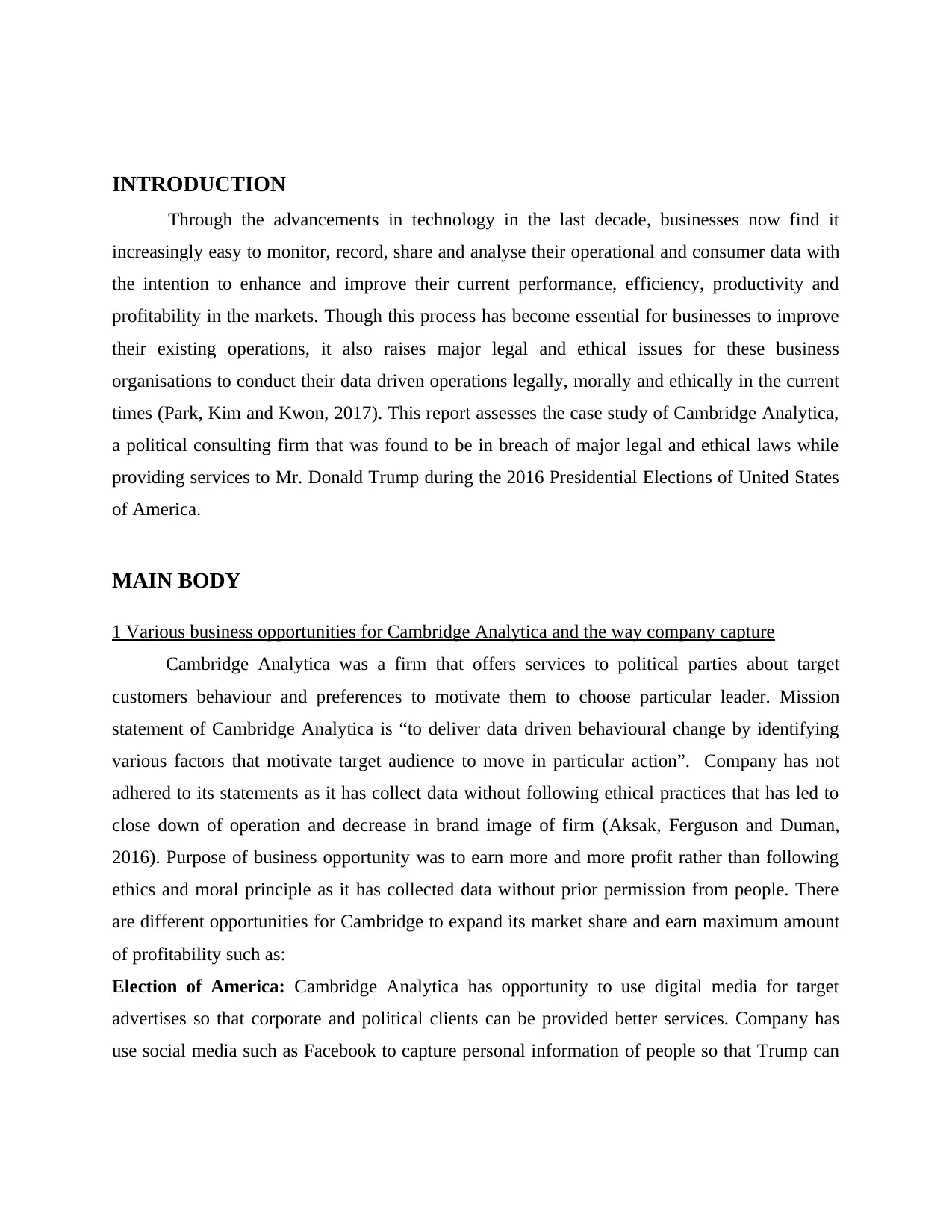
INTRODUCTION
Through the advancements in technology in the last decade, businesses now find it
increasingly easy to monitor, record, share and analyse their operational and consumer data with
the intention to enhance and improve their current performance, efficiency, productivity and
profitability in the markets. Though this process has become essential for businesses to improve
their existing operations, it also raises major legal and ethical issues for these business
organisations to conduct their data driven operations legally, morally and ethically in the current
times (Park, Kim and Kwon, 2017). This report assesses the case study of Cambridge Analytica,
a political consulting firm that was found to be in breach of major legal and ethical laws while
providing services to Mr. Donald Trump during the 2016 Presidential Elections of United States
of America.
MAIN BODY
1 Various business opportunities for Cambridge Analytica and the way company capture
Cambridge Analytica was a firm that offers services to political parties about target
customers behaviour and preferences to motivate them to choose particular leader. Mission
statement of Cambridge Analytica is “to deliver data driven behavioural change by identifying
various factors that motivate target audience to move in particular action”. Company has not
adhered to its statements as it has collect data without following ethical practices that has led to
close down of operation and decrease in brand image of firm (Aksak, Ferguson and Duman,
2016). Purpose of business opportunity was to earn more and more profit rather than following
ethics and moral principle as it has collected data without prior permission from people. There
are different opportunities for Cambridge to expand its market share and earn maximum amount
of profitability such as:
Election of America: Cambridge Analytica has opportunity to use digital media for target
advertises so that corporate and political clients can be provided better services. Company has
use social media such as Facebook to capture personal information of people so that Trump can
Through the advancements in technology in the last decade, businesses now find it
increasingly easy to monitor, record, share and analyse their operational and consumer data with
the intention to enhance and improve their current performance, efficiency, productivity and
profitability in the markets. Though this process has become essential for businesses to improve
their existing operations, it also raises major legal and ethical issues for these business
organisations to conduct their data driven operations legally, morally and ethically in the current
times (Park, Kim and Kwon, 2017). This report assesses the case study of Cambridge Analytica,
a political consulting firm that was found to be in breach of major legal and ethical laws while
providing services to Mr. Donald Trump during the 2016 Presidential Elections of United States
of America.
MAIN BODY
1 Various business opportunities for Cambridge Analytica and the way company capture
Cambridge Analytica was a firm that offers services to political parties about target
customers behaviour and preferences to motivate them to choose particular leader. Mission
statement of Cambridge Analytica is “to deliver data driven behavioural change by identifying
various factors that motivate target audience to move in particular action”. Company has not
adhered to its statements as it has collect data without following ethical practices that has led to
close down of operation and decrease in brand image of firm (Aksak, Ferguson and Duman,
2016). Purpose of business opportunity was to earn more and more profit rather than following
ethics and moral principle as it has collected data without prior permission from people. There
are different opportunities for Cambridge to expand its market share and earn maximum amount
of profitability such as:
Election of America: Cambridge Analytica has opportunity to use digital media for target
advertises so that corporate and political clients can be provided better services. Company has
use social media such as Facebook to capture personal information of people so that Trump can
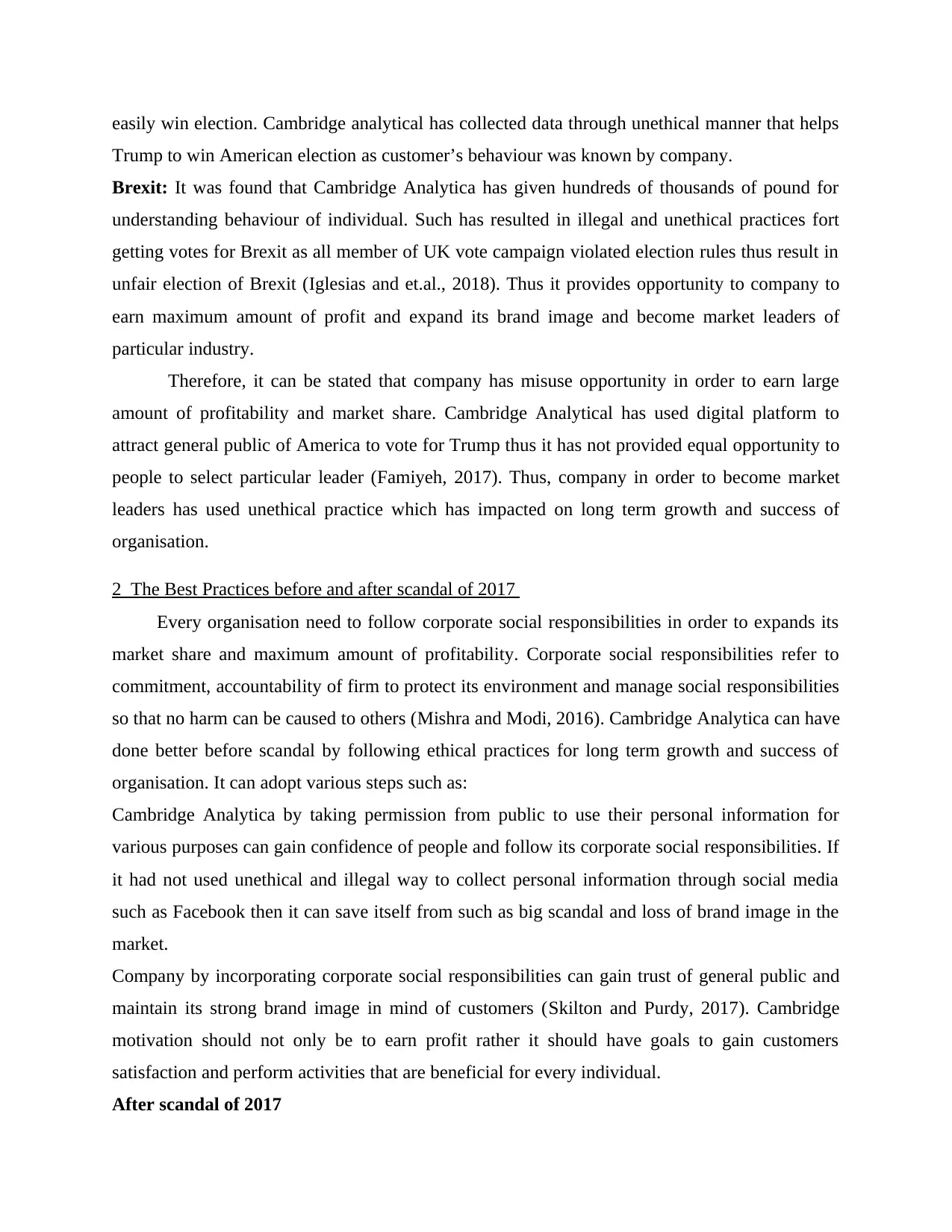
easily win election. Cambridge analytical has collected data through unethical manner that helps
Trump to win American election as customer’s behaviour was known by company.
Brexit: It was found that Cambridge Analytica has given hundreds of thousands of pound for
understanding behaviour of individual. Such has resulted in illegal and unethical practices fort
getting votes for Brexit as all member of UK vote campaign violated election rules thus result in
unfair election of Brexit (Iglesias and et.al., 2018). Thus it provides opportunity to company to
earn maximum amount of profit and expand its brand image and become market leaders of
particular industry.
Therefore, it can be stated that company has misuse opportunity in order to earn large
amount of profitability and market share. Cambridge Analytical has used digital platform to
attract general public of America to vote for Trump thus it has not provided equal opportunity to
people to select particular leader (Famiyeh, 2017). Thus, company in order to become market
leaders has used unethical practice which has impacted on long term growth and success of
organisation.
2 The Best Practices before and after scandal of 2017
Every organisation need to follow corporate social responsibilities in order to expands its
market share and maximum amount of profitability. Corporate social responsibilities refer to
commitment, accountability of firm to protect its environment and manage social responsibilities
so that no harm can be caused to others (Mishra and Modi, 2016). Cambridge Analytica can have
done better before scandal by following ethical practices for long term growth and success of
organisation. It can adopt various steps such as:
Cambridge Analytica by taking permission from public to use their personal information for
various purposes can gain confidence of people and follow its corporate social responsibilities. If
it had not used unethical and illegal way to collect personal information through social media
such as Facebook then it can save itself from such as big scandal and loss of brand image in the
market.
Company by incorporating corporate social responsibilities can gain trust of general public and
maintain its strong brand image in mind of customers (Skilton and Purdy, 2017). Cambridge
motivation should not only be to earn profit rather it should have goals to gain customers
satisfaction and perform activities that are beneficial for every individual.
After scandal of 2017
Trump to win American election as customer’s behaviour was known by company.
Brexit: It was found that Cambridge Analytica has given hundreds of thousands of pound for
understanding behaviour of individual. Such has resulted in illegal and unethical practices fort
getting votes for Brexit as all member of UK vote campaign violated election rules thus result in
unfair election of Brexit (Iglesias and et.al., 2018). Thus it provides opportunity to company to
earn maximum amount of profit and expand its brand image and become market leaders of
particular industry.
Therefore, it can be stated that company has misuse opportunity in order to earn large
amount of profitability and market share. Cambridge Analytical has used digital platform to
attract general public of America to vote for Trump thus it has not provided equal opportunity to
people to select particular leader (Famiyeh, 2017). Thus, company in order to become market
leaders has used unethical practice which has impacted on long term growth and success of
organisation.
2 The Best Practices before and after scandal of 2017
Every organisation need to follow corporate social responsibilities in order to expands its
market share and maximum amount of profitability. Corporate social responsibilities refer to
commitment, accountability of firm to protect its environment and manage social responsibilities
so that no harm can be caused to others (Mishra and Modi, 2016). Cambridge Analytica can have
done better before scandal by following ethical practices for long term growth and success of
organisation. It can adopt various steps such as:
Cambridge Analytica by taking permission from public to use their personal information for
various purposes can gain confidence of people and follow its corporate social responsibilities. If
it had not used unethical and illegal way to collect personal information through social media
such as Facebook then it can save itself from such as big scandal and loss of brand image in the
market.
Company by incorporating corporate social responsibilities can gain trust of general public and
maintain its strong brand image in mind of customers (Skilton and Purdy, 2017). Cambridge
motivation should not only be to earn profit rather it should have goals to gain customers
satisfaction and perform activities that are beneficial for every individual.
After scandal of 2017
Secure Best Marks with AI Grader
Need help grading? Try our AI Grader for instant feedback on your assignments.
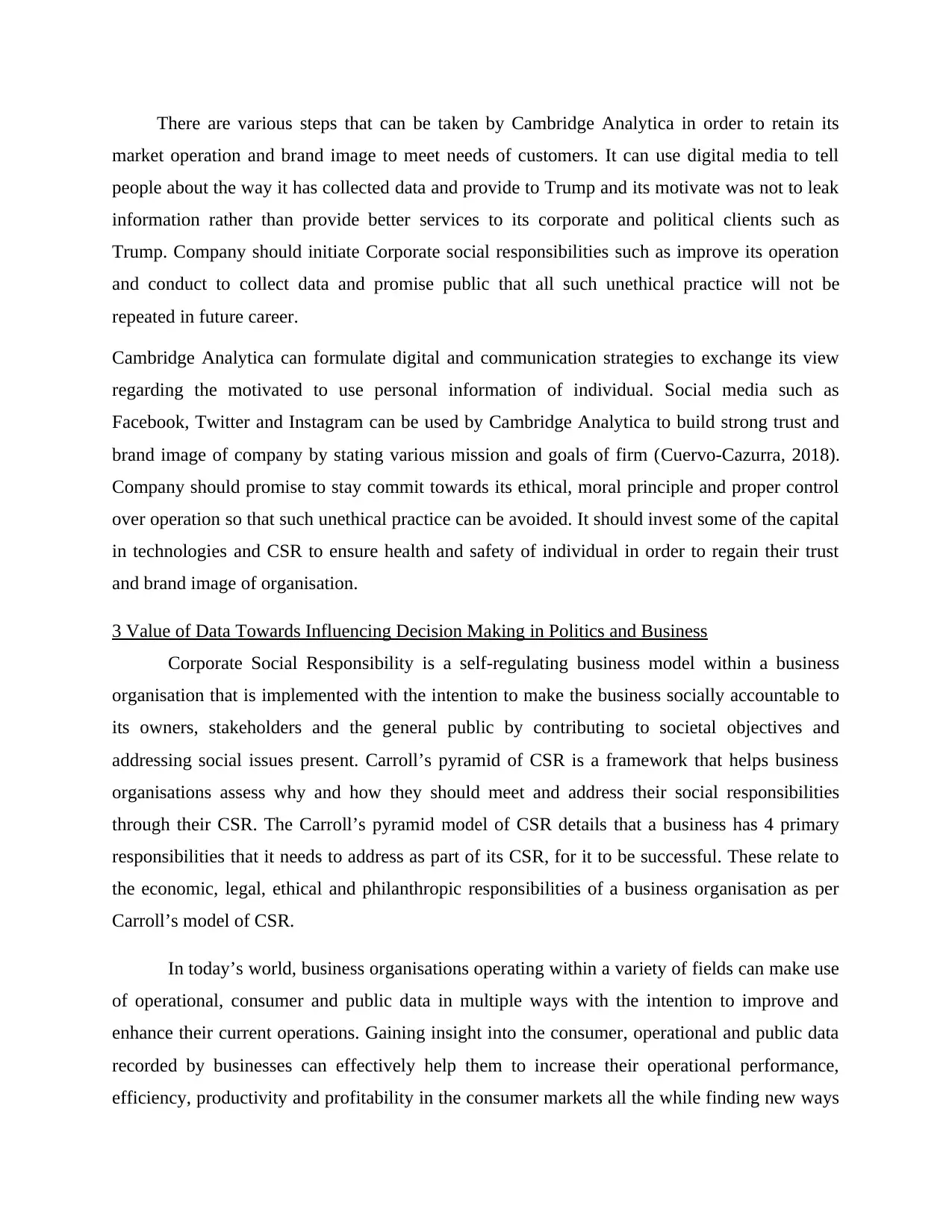
There are various steps that can be taken by Cambridge Analytica in order to retain its
market operation and brand image to meet needs of customers. It can use digital media to tell
people about the way it has collected data and provide to Trump and its motivate was not to leak
information rather than provide better services to its corporate and political clients such as
Trump. Company should initiate Corporate social responsibilities such as improve its operation
and conduct to collect data and promise public that all such unethical practice will not be
repeated in future career.
Cambridge Analytica can formulate digital and communication strategies to exchange its view
regarding the motivated to use personal information of individual. Social media such as
Facebook, Twitter and Instagram can be used by Cambridge Analytica to build strong trust and
brand image of company by stating various mission and goals of firm (Cuervo-Cazurra, 2018).
Company should promise to stay commit towards its ethical, moral principle and proper control
over operation so that such unethical practice can be avoided. It should invest some of the capital
in technologies and CSR to ensure health and safety of individual in order to regain their trust
and brand image of organisation.
3 Value of Data Towards Influencing Decision Making in Politics and Business
Corporate Social Responsibility is a self-regulating business model within a business
organisation that is implemented with the intention to make the business socially accountable to
its owners, stakeholders and the general public by contributing to societal objectives and
addressing social issues present. Carroll’s pyramid of CSR is a framework that helps business
organisations assess why and how they should meet and address their social responsibilities
through their CSR. The Carroll’s pyramid model of CSR details that a business has 4 primary
responsibilities that it needs to address as part of its CSR, for it to be successful. These relate to
the economic, legal, ethical and philanthropic responsibilities of a business organisation as per
Carroll’s model of CSR.
In today’s world, business organisations operating within a variety of fields can make use
of operational, consumer and public data in multiple ways with the intention to improve and
enhance their current operations. Gaining insight into the consumer, operational and public data
recorded by businesses can effectively help them to increase their operational performance,
efficiency, productivity and profitability in the consumer markets all the while finding new ways
market operation and brand image to meet needs of customers. It can use digital media to tell
people about the way it has collected data and provide to Trump and its motivate was not to leak
information rather than provide better services to its corporate and political clients such as
Trump. Company should initiate Corporate social responsibilities such as improve its operation
and conduct to collect data and promise public that all such unethical practice will not be
repeated in future career.
Cambridge Analytica can formulate digital and communication strategies to exchange its view
regarding the motivated to use personal information of individual. Social media such as
Facebook, Twitter and Instagram can be used by Cambridge Analytica to build strong trust and
brand image of company by stating various mission and goals of firm (Cuervo-Cazurra, 2018).
Company should promise to stay commit towards its ethical, moral principle and proper control
over operation so that such unethical practice can be avoided. It should invest some of the capital
in technologies and CSR to ensure health and safety of individual in order to regain their trust
and brand image of organisation.
3 Value of Data Towards Influencing Decision Making in Politics and Business
Corporate Social Responsibility is a self-regulating business model within a business
organisation that is implemented with the intention to make the business socially accountable to
its owners, stakeholders and the general public by contributing to societal objectives and
addressing social issues present. Carroll’s pyramid of CSR is a framework that helps business
organisations assess why and how they should meet and address their social responsibilities
through their CSR. The Carroll’s pyramid model of CSR details that a business has 4 primary
responsibilities that it needs to address as part of its CSR, for it to be successful. These relate to
the economic, legal, ethical and philanthropic responsibilities of a business organisation as per
Carroll’s model of CSR.
In today’s world, business organisations operating within a variety of fields can make use
of operational, consumer and public data in multiple ways with the intention to improve and
enhance their current operations. Gaining insight into the consumer, operational and public data
recorded by businesses can effectively help them to increase their operational performance,
efficiency, productivity and profitability in the consumer markets all the while finding new ways
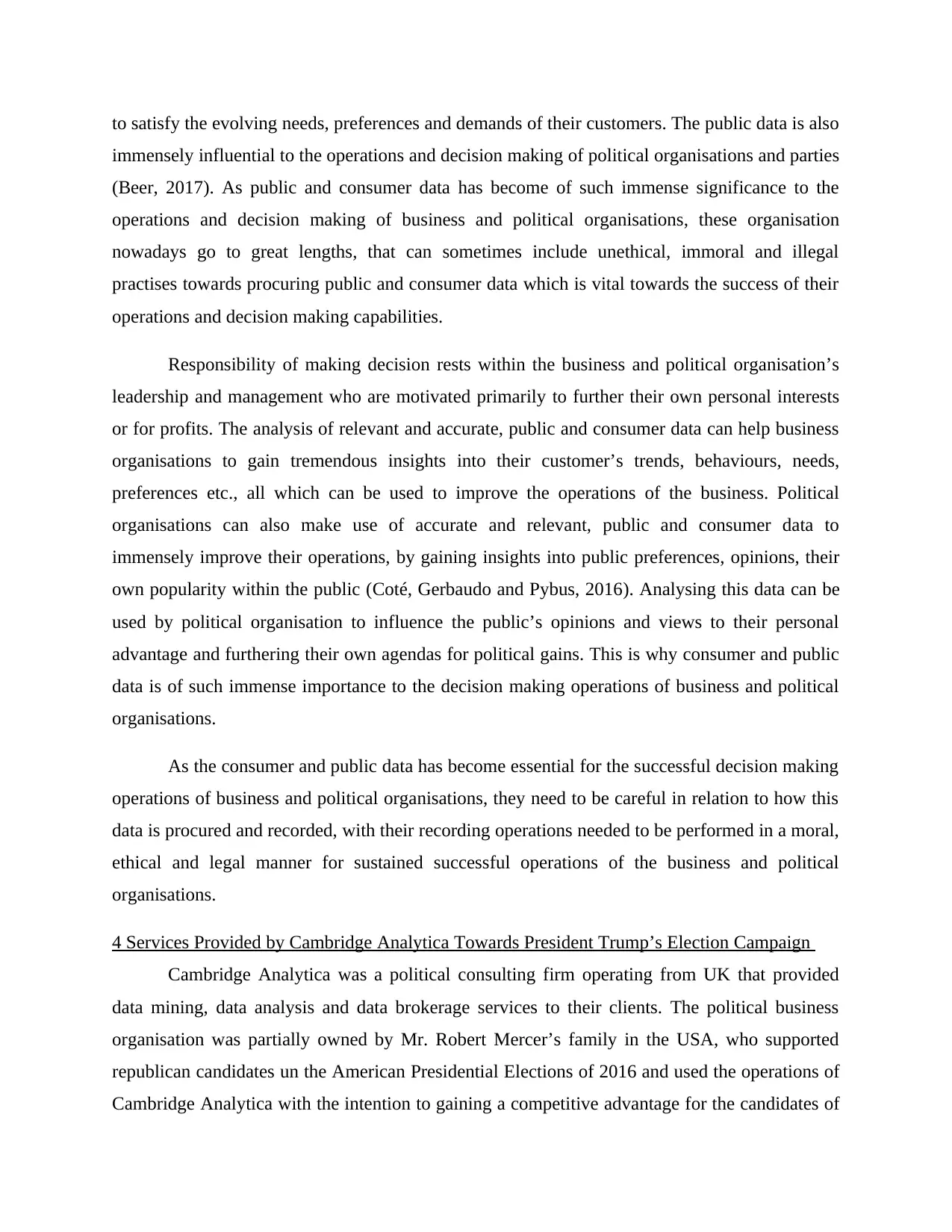
to satisfy the evolving needs, preferences and demands of their customers. The public data is also
immensely influential to the operations and decision making of political organisations and parties
(Beer, 2017). As public and consumer data has become of such immense significance to the
operations and decision making of business and political organisations, these organisation
nowadays go to great lengths, that can sometimes include unethical, immoral and illegal
practises towards procuring public and consumer data which is vital towards the success of their
operations and decision making capabilities.
Responsibility of making decision rests within the business and political organisation’s
leadership and management who are motivated primarily to further their own personal interests
or for profits. The analysis of relevant and accurate, public and consumer data can help business
organisations to gain tremendous insights into their customer’s trends, behaviours, needs,
preferences etc., all which can be used to improve the operations of the business. Political
organisations can also make use of accurate and relevant, public and consumer data to
immensely improve their operations, by gaining insights into public preferences, opinions, their
own popularity within the public (Coté, Gerbaudo and Pybus, 2016). Analysing this data can be
used by political organisation to influence the public’s opinions and views to their personal
advantage and furthering their own agendas for political gains. This is why consumer and public
data is of such immense importance to the decision making operations of business and political
organisations.
As the consumer and public data has become essential for the successful decision making
operations of business and political organisations, they need to be careful in relation to how this
data is procured and recorded, with their recording operations needed to be performed in a moral,
ethical and legal manner for sustained successful operations of the business and political
organisations.
4 Services Provided by Cambridge Analytica Towards President Trump’s Election Campaign
Cambridge Analytica was a political consulting firm operating from UK that provided
data mining, data analysis and data brokerage services to their clients. The political business
organisation was partially owned by Mr. Robert Mercer’s family in the USA, who supported
republican candidates un the American Presidential Elections of 2016 and used the operations of
Cambridge Analytica with the intention to gaining a competitive advantage for the candidates of
immensely influential to the operations and decision making of political organisations and parties
(Beer, 2017). As public and consumer data has become of such immense significance to the
operations and decision making of business and political organisations, these organisation
nowadays go to great lengths, that can sometimes include unethical, immoral and illegal
practises towards procuring public and consumer data which is vital towards the success of their
operations and decision making capabilities.
Responsibility of making decision rests within the business and political organisation’s
leadership and management who are motivated primarily to further their own personal interests
or for profits. The analysis of relevant and accurate, public and consumer data can help business
organisations to gain tremendous insights into their customer’s trends, behaviours, needs,
preferences etc., all which can be used to improve the operations of the business. Political
organisations can also make use of accurate and relevant, public and consumer data to
immensely improve their operations, by gaining insights into public preferences, opinions, their
own popularity within the public (Coté, Gerbaudo and Pybus, 2016). Analysing this data can be
used by political organisation to influence the public’s opinions and views to their personal
advantage and furthering their own agendas for political gains. This is why consumer and public
data is of such immense importance to the decision making operations of business and political
organisations.
As the consumer and public data has become essential for the successful decision making
operations of business and political organisations, they need to be careful in relation to how this
data is procured and recorded, with their recording operations needed to be performed in a moral,
ethical and legal manner for sustained successful operations of the business and political
organisations.
4 Services Provided by Cambridge Analytica Towards President Trump’s Election Campaign
Cambridge Analytica was a political consulting firm operating from UK that provided
data mining, data analysis and data brokerage services to their clients. The political business
organisation was partially owned by Mr. Robert Mercer’s family in the USA, who supported
republican candidates un the American Presidential Elections of 2016 and used the operations of
Cambridge Analytica with the intention to gaining a competitive advantage for the candidates of
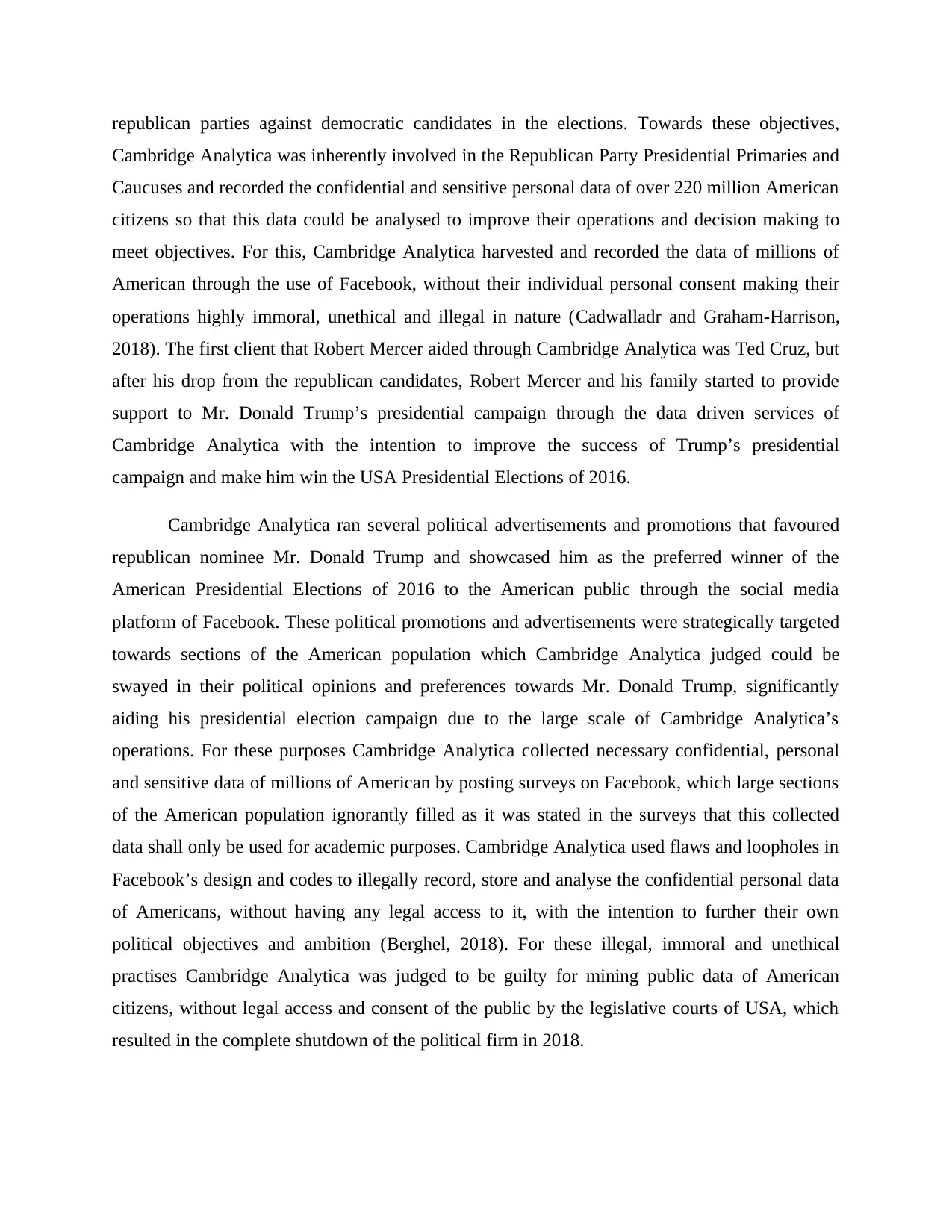
republican parties against democratic candidates in the elections. Towards these objectives,
Cambridge Analytica was inherently involved in the Republican Party Presidential Primaries and
Caucuses and recorded the confidential and sensitive personal data of over 220 million American
citizens so that this data could be analysed to improve their operations and decision making to
meet objectives. For this, Cambridge Analytica harvested and recorded the data of millions of
American through the use of Facebook, without their individual personal consent making their
operations highly immoral, unethical and illegal in nature (Cadwalladr and Graham-Harrison,
2018). The first client that Robert Mercer aided through Cambridge Analytica was Ted Cruz, but
after his drop from the republican candidates, Robert Mercer and his family started to provide
support to Mr. Donald Trump’s presidential campaign through the data driven services of
Cambridge Analytica with the intention to improve the success of Trump’s presidential
campaign and make him win the USA Presidential Elections of 2016.
Cambridge Analytica ran several political advertisements and promotions that favoured
republican nominee Mr. Donald Trump and showcased him as the preferred winner of the
American Presidential Elections of 2016 to the American public through the social media
platform of Facebook. These political promotions and advertisements were strategically targeted
towards sections of the American population which Cambridge Analytica judged could be
swayed in their political opinions and preferences towards Mr. Donald Trump, significantly
aiding his presidential election campaign due to the large scale of Cambridge Analytica’s
operations. For these purposes Cambridge Analytica collected necessary confidential, personal
and sensitive data of millions of American by posting surveys on Facebook, which large sections
of the American population ignorantly filled as it was stated in the surveys that this collected
data shall only be used for academic purposes. Cambridge Analytica used flaws and loopholes in
Facebook’s design and codes to illegally record, store and analyse the confidential personal data
of Americans, without having any legal access to it, with the intention to further their own
political objectives and ambition (Berghel, 2018). For these illegal, immoral and unethical
practises Cambridge Analytica was judged to be guilty for mining public data of American
citizens, without legal access and consent of the public by the legislative courts of USA, which
resulted in the complete shutdown of the political firm in 2018.
Cambridge Analytica was inherently involved in the Republican Party Presidential Primaries and
Caucuses and recorded the confidential and sensitive personal data of over 220 million American
citizens so that this data could be analysed to improve their operations and decision making to
meet objectives. For this, Cambridge Analytica harvested and recorded the data of millions of
American through the use of Facebook, without their individual personal consent making their
operations highly immoral, unethical and illegal in nature (Cadwalladr and Graham-Harrison,
2018). The first client that Robert Mercer aided through Cambridge Analytica was Ted Cruz, but
after his drop from the republican candidates, Robert Mercer and his family started to provide
support to Mr. Donald Trump’s presidential campaign through the data driven services of
Cambridge Analytica with the intention to improve the success of Trump’s presidential
campaign and make him win the USA Presidential Elections of 2016.
Cambridge Analytica ran several political advertisements and promotions that favoured
republican nominee Mr. Donald Trump and showcased him as the preferred winner of the
American Presidential Elections of 2016 to the American public through the social media
platform of Facebook. These political promotions and advertisements were strategically targeted
towards sections of the American population which Cambridge Analytica judged could be
swayed in their political opinions and preferences towards Mr. Donald Trump, significantly
aiding his presidential election campaign due to the large scale of Cambridge Analytica’s
operations. For these purposes Cambridge Analytica collected necessary confidential, personal
and sensitive data of millions of American by posting surveys on Facebook, which large sections
of the American population ignorantly filled as it was stated in the surveys that this collected
data shall only be used for academic purposes. Cambridge Analytica used flaws and loopholes in
Facebook’s design and codes to illegally record, store and analyse the confidential personal data
of Americans, without having any legal access to it, with the intention to further their own
political objectives and ambition (Berghel, 2018). For these illegal, immoral and unethical
practises Cambridge Analytica was judged to be guilty for mining public data of American
citizens, without legal access and consent of the public by the legislative courts of USA, which
resulted in the complete shutdown of the political firm in 2018.
Paraphrase This Document
Need a fresh take? Get an instant paraphrase of this document with our AI Paraphraser
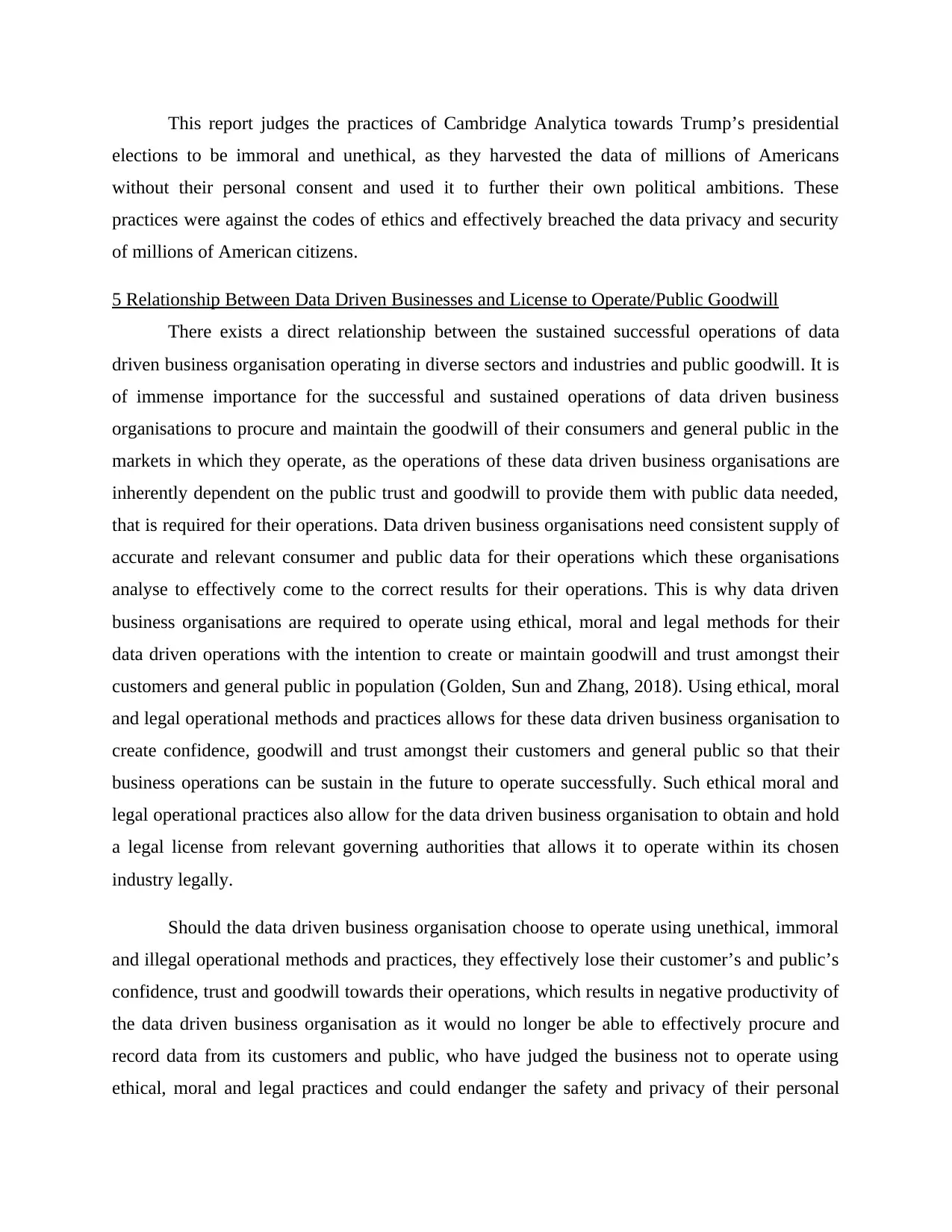
This report judges the practices of Cambridge Analytica towards Trump’s presidential
elections to be immoral and unethical, as they harvested the data of millions of Americans
without their personal consent and used it to further their own political ambitions. These
practices were against the codes of ethics and effectively breached the data privacy and security
of millions of American citizens.
5 Relationship Between Data Driven Businesses and License to Operate/Public Goodwill
There exists a direct relationship between the sustained successful operations of data
driven business organisation operating in diverse sectors and industries and public goodwill. It is
of immense importance for the successful and sustained operations of data driven business
organisations to procure and maintain the goodwill of their consumers and general public in the
markets in which they operate, as the operations of these data driven business organisations are
inherently dependent on the public trust and goodwill to provide them with public data needed,
that is required for their operations. Data driven business organisations need consistent supply of
accurate and relevant consumer and public data for their operations which these organisations
analyse to effectively come to the correct results for their operations. This is why data driven
business organisations are required to operate using ethical, moral and legal methods for their
data driven operations with the intention to create or maintain goodwill and trust amongst their
customers and general public in population (Golden, Sun and Zhang, 2018). Using ethical, moral
and legal operational methods and practices allows for these data driven business organisation to
create confidence, goodwill and trust amongst their customers and general public so that their
business operations can be sustain in the future to operate successfully. Such ethical moral and
legal operational practices also allow for the data driven business organisation to obtain and hold
a legal license from relevant governing authorities that allows it to operate within its chosen
industry legally.
Should the data driven business organisation choose to operate using unethical, immoral
and illegal operational methods and practices, they effectively lose their customer’s and public’s
confidence, trust and goodwill towards their operations, which results in negative productivity of
the data driven business organisation as it would no longer be able to effectively procure and
record data from its customers and public, who have judged the business not to operate using
ethical, moral and legal practices and could endanger the safety and privacy of their personal
elections to be immoral and unethical, as they harvested the data of millions of Americans
without their personal consent and used it to further their own political ambitions. These
practices were against the codes of ethics and effectively breached the data privacy and security
of millions of American citizens.
5 Relationship Between Data Driven Businesses and License to Operate/Public Goodwill
There exists a direct relationship between the sustained successful operations of data
driven business organisation operating in diverse sectors and industries and public goodwill. It is
of immense importance for the successful and sustained operations of data driven business
organisations to procure and maintain the goodwill of their consumers and general public in the
markets in which they operate, as the operations of these data driven business organisations are
inherently dependent on the public trust and goodwill to provide them with public data needed,
that is required for their operations. Data driven business organisations need consistent supply of
accurate and relevant consumer and public data for their operations which these organisations
analyse to effectively come to the correct results for their operations. This is why data driven
business organisations are required to operate using ethical, moral and legal methods for their
data driven operations with the intention to create or maintain goodwill and trust amongst their
customers and general public in population (Golden, Sun and Zhang, 2018). Using ethical, moral
and legal operational methods and practices allows for these data driven business organisation to
create confidence, goodwill and trust amongst their customers and general public so that their
business operations can be sustain in the future to operate successfully. Such ethical moral and
legal operational practices also allow for the data driven business organisation to obtain and hold
a legal license from relevant governing authorities that allows it to operate within its chosen
industry legally.
Should the data driven business organisation choose to operate using unethical, immoral
and illegal operational methods and practices, they effectively lose their customer’s and public’s
confidence, trust and goodwill towards their operations, which results in negative productivity of
the data driven business organisation as it would no longer be able to effectively procure and
record data from its customers and public, who have judged the business not to operate using
ethical, moral and legal practices and could endanger the safety and privacy of their personal
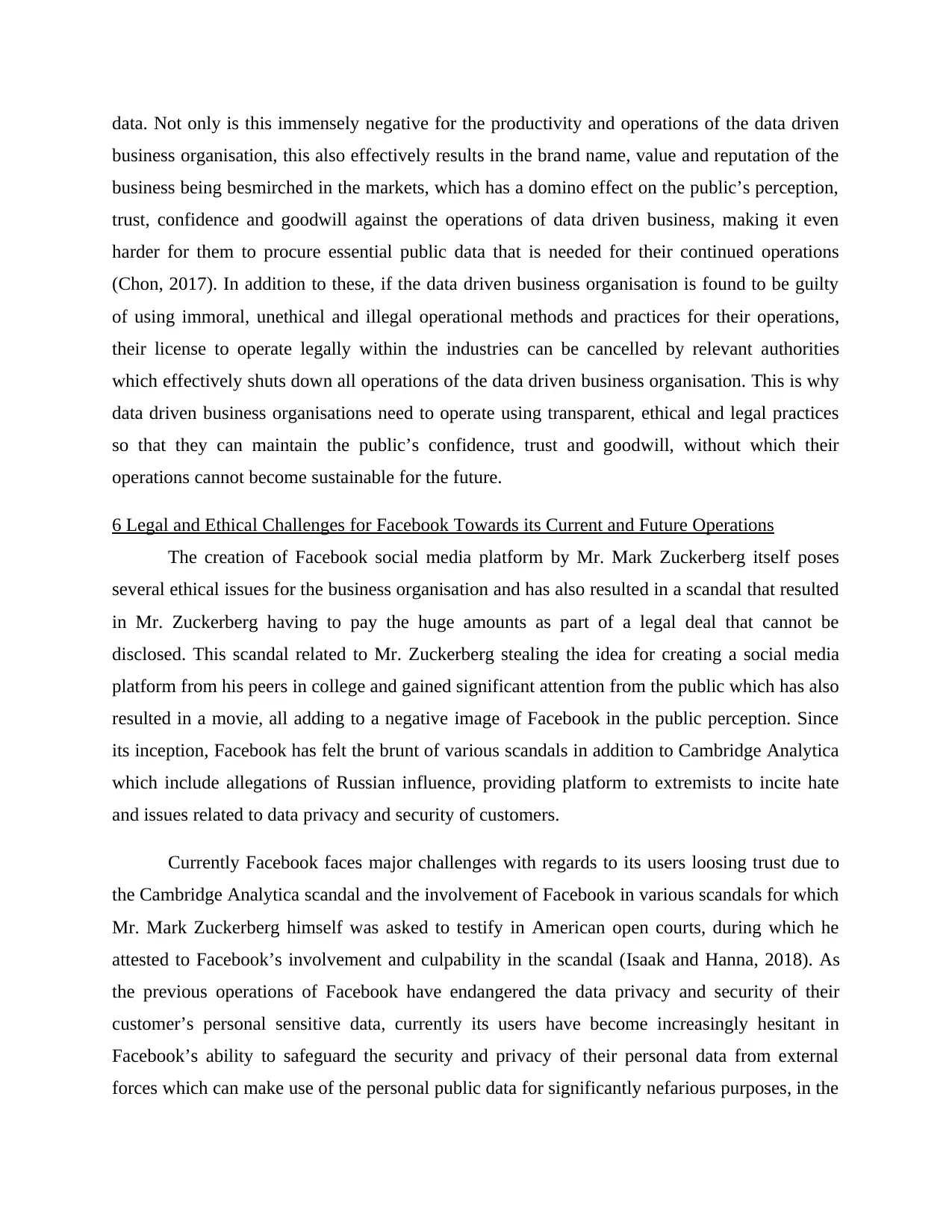
data. Not only is this immensely negative for the productivity and operations of the data driven
business organisation, this also effectively results in the brand name, value and reputation of the
business being besmirched in the markets, which has a domino effect on the public’s perception,
trust, confidence and goodwill against the operations of data driven business, making it even
harder for them to procure essential public data that is needed for their continued operations
(Chon, 2017). In addition to these, if the data driven business organisation is found to be guilty
of using immoral, unethical and illegal operational methods and practices for their operations,
their license to operate legally within the industries can be cancelled by relevant authorities
which effectively shuts down all operations of the data driven business organisation. This is why
data driven business organisations need to operate using transparent, ethical and legal practices
so that they can maintain the public’s confidence, trust and goodwill, without which their
operations cannot become sustainable for the future.
6 Legal and Ethical Challenges for Facebook Towards its Current and Future Operations
The creation of Facebook social media platform by Mr. Mark Zuckerberg itself poses
several ethical issues for the business organisation and has also resulted in a scandal that resulted
in Mr. Zuckerberg having to pay the huge amounts as part of a legal deal that cannot be
disclosed. This scandal related to Mr. Zuckerberg stealing the idea for creating a social media
platform from his peers in college and gained significant attention from the public which has also
resulted in a movie, all adding to a negative image of Facebook in the public perception. Since
its inception, Facebook has felt the brunt of various scandals in addition to Cambridge Analytica
which include allegations of Russian influence, providing platform to extremists to incite hate
and issues related to data privacy and security of customers.
Currently Facebook faces major challenges with regards to its users loosing trust due to
the Cambridge Analytica scandal and the involvement of Facebook in various scandals for which
Mr. Mark Zuckerberg himself was asked to testify in American open courts, during which he
attested to Facebook’s involvement and culpability in the scandal (Isaak and Hanna, 2018). As
the previous operations of Facebook have endangered the data privacy and security of their
customer’s personal sensitive data, currently its users have become increasingly hesitant in
Facebook’s ability to safeguard the security and privacy of their personal data from external
forces which can make use of the personal public data for significantly nefarious purposes, in the
business organisation, this also effectively results in the brand name, value and reputation of the
business being besmirched in the markets, which has a domino effect on the public’s perception,
trust, confidence and goodwill against the operations of data driven business, making it even
harder for them to procure essential public data that is needed for their continued operations
(Chon, 2017). In addition to these, if the data driven business organisation is found to be guilty
of using immoral, unethical and illegal operational methods and practices for their operations,
their license to operate legally within the industries can be cancelled by relevant authorities
which effectively shuts down all operations of the data driven business organisation. This is why
data driven business organisations need to operate using transparent, ethical and legal practices
so that they can maintain the public’s confidence, trust and goodwill, without which their
operations cannot become sustainable for the future.
6 Legal and Ethical Challenges for Facebook Towards its Current and Future Operations
The creation of Facebook social media platform by Mr. Mark Zuckerberg itself poses
several ethical issues for the business organisation and has also resulted in a scandal that resulted
in Mr. Zuckerberg having to pay the huge amounts as part of a legal deal that cannot be
disclosed. This scandal related to Mr. Zuckerberg stealing the idea for creating a social media
platform from his peers in college and gained significant attention from the public which has also
resulted in a movie, all adding to a negative image of Facebook in the public perception. Since
its inception, Facebook has felt the brunt of various scandals in addition to Cambridge Analytica
which include allegations of Russian influence, providing platform to extremists to incite hate
and issues related to data privacy and security of customers.
Currently Facebook faces major challenges with regards to its users loosing trust due to
the Cambridge Analytica scandal and the involvement of Facebook in various scandals for which
Mr. Mark Zuckerberg himself was asked to testify in American open courts, during which he
attested to Facebook’s involvement and culpability in the scandal (Isaak and Hanna, 2018). As
the previous operations of Facebook have endangered the data privacy and security of their
customer’s personal sensitive data, currently its users have become increasingly hesitant in
Facebook’s ability to safeguard the security and privacy of their personal data from external
forces which can make use of the personal public data for significantly nefarious purposes, in the
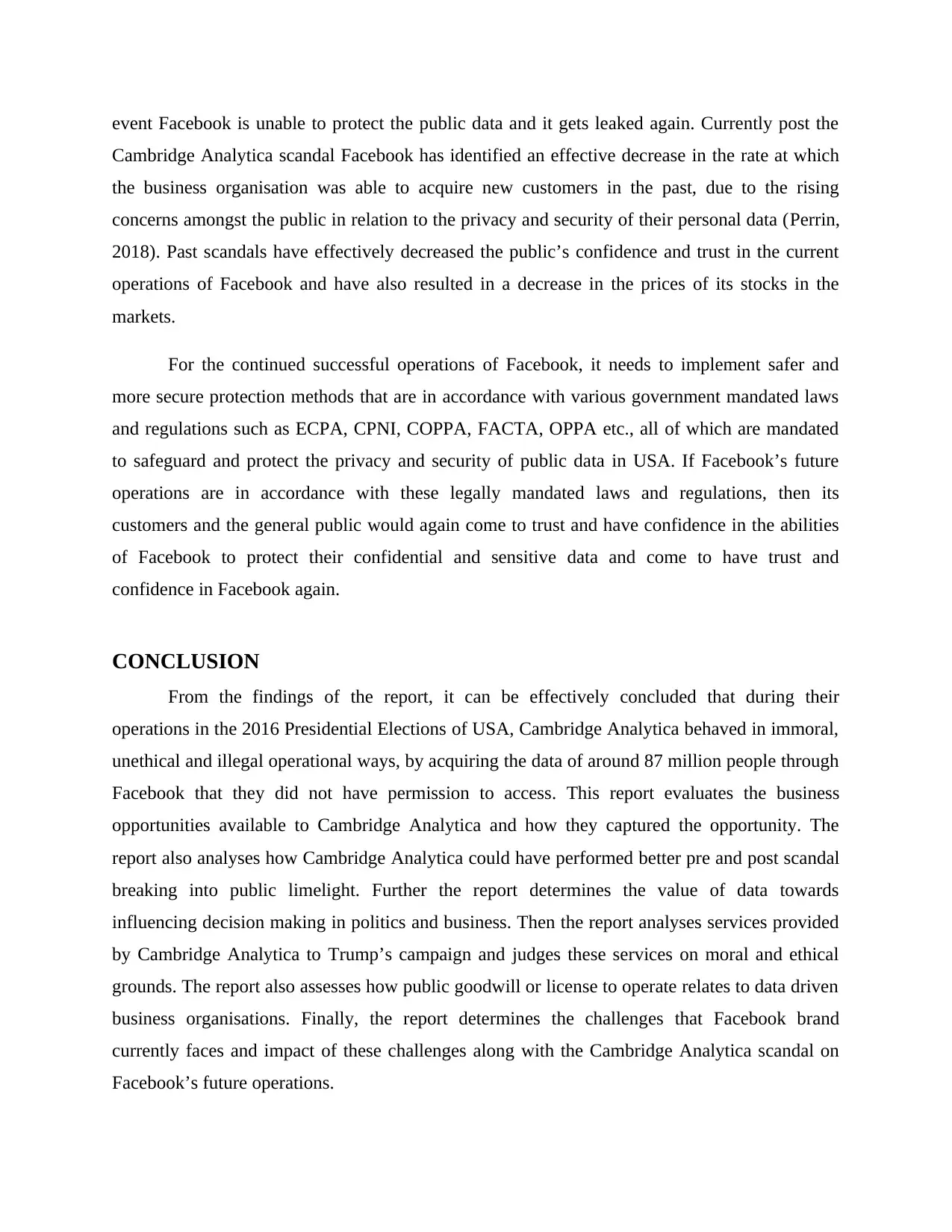
event Facebook is unable to protect the public data and it gets leaked again. Currently post the
Cambridge Analytica scandal Facebook has identified an effective decrease in the rate at which
the business organisation was able to acquire new customers in the past, due to the rising
concerns amongst the public in relation to the privacy and security of their personal data (Perrin,
2018). Past scandals have effectively decreased the public’s confidence and trust in the current
operations of Facebook and have also resulted in a decrease in the prices of its stocks in the
markets.
For the continued successful operations of Facebook, it needs to implement safer and
more secure protection methods that are in accordance with various government mandated laws
and regulations such as ECPA, CPNI, COPPA, FACTA, OPPA etc., all of which are mandated
to safeguard and protect the privacy and security of public data in USA. If Facebook’s future
operations are in accordance with these legally mandated laws and regulations, then its
customers and the general public would again come to trust and have confidence in the abilities
of Facebook to protect their confidential and sensitive data and come to have trust and
confidence in Facebook again.
CONCLUSION
From the findings of the report, it can be effectively concluded that during their
operations in the 2016 Presidential Elections of USA, Cambridge Analytica behaved in immoral,
unethical and illegal operational ways, by acquiring the data of around 87 million people through
Facebook that they did not have permission to access. This report evaluates the business
opportunities available to Cambridge Analytica and how they captured the opportunity. The
report also analyses how Cambridge Analytica could have performed better pre and post scandal
breaking into public limelight. Further the report determines the value of data towards
influencing decision making in politics and business. Then the report analyses services provided
by Cambridge Analytica to Trump’s campaign and judges these services on moral and ethical
grounds. The report also assesses how public goodwill or license to operate relates to data driven
business organisations. Finally, the report determines the challenges that Facebook brand
currently faces and impact of these challenges along with the Cambridge Analytica scandal on
Facebook’s future operations.
Cambridge Analytica scandal Facebook has identified an effective decrease in the rate at which
the business organisation was able to acquire new customers in the past, due to the rising
concerns amongst the public in relation to the privacy and security of their personal data (Perrin,
2018). Past scandals have effectively decreased the public’s confidence and trust in the current
operations of Facebook and have also resulted in a decrease in the prices of its stocks in the
markets.
For the continued successful operations of Facebook, it needs to implement safer and
more secure protection methods that are in accordance with various government mandated laws
and regulations such as ECPA, CPNI, COPPA, FACTA, OPPA etc., all of which are mandated
to safeguard and protect the privacy and security of public data in USA. If Facebook’s future
operations are in accordance with these legally mandated laws and regulations, then its
customers and the general public would again come to trust and have confidence in the abilities
of Facebook to protect their confidential and sensitive data and come to have trust and
confidence in Facebook again.
CONCLUSION
From the findings of the report, it can be effectively concluded that during their
operations in the 2016 Presidential Elections of USA, Cambridge Analytica behaved in immoral,
unethical and illegal operational ways, by acquiring the data of around 87 million people through
Facebook that they did not have permission to access. This report evaluates the business
opportunities available to Cambridge Analytica and how they captured the opportunity. The
report also analyses how Cambridge Analytica could have performed better pre and post scandal
breaking into public limelight. Further the report determines the value of data towards
influencing decision making in politics and business. Then the report analyses services provided
by Cambridge Analytica to Trump’s campaign and judges these services on moral and ethical
grounds. The report also assesses how public goodwill or license to operate relates to data driven
business organisations. Finally, the report determines the challenges that Facebook brand
currently faces and impact of these challenges along with the Cambridge Analytica scandal on
Facebook’s future operations.
Secure Best Marks with AI Grader
Need help grading? Try our AI Grader for instant feedback on your assignments.
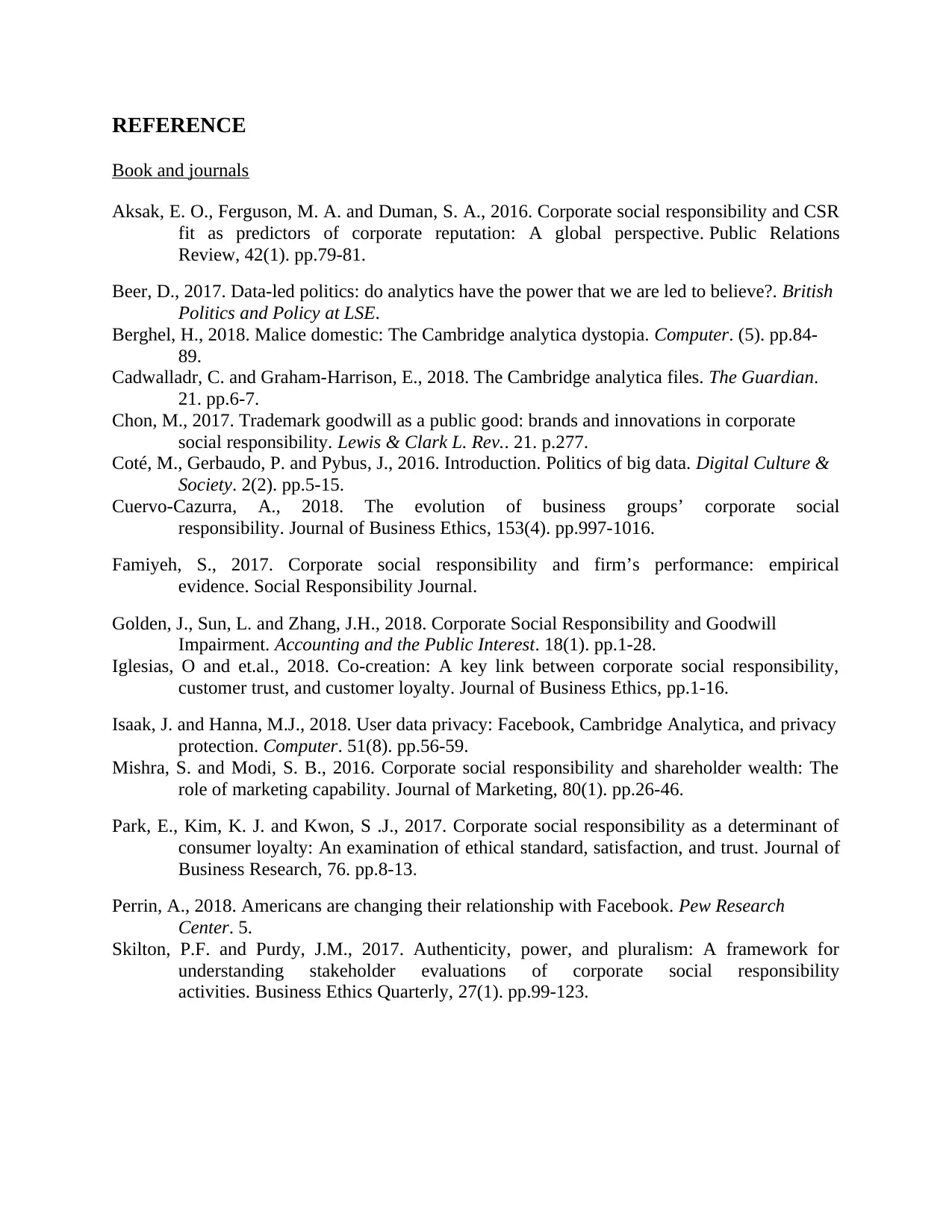
REFERENCE
Book and journals
Aksak, E. O., Ferguson, M. A. and Duman, S. A., 2016. Corporate social responsibility and CSR
fit as predictors of corporate reputation: A global perspective. Public Relations
Review, 42(1). pp.79-81.
Beer, D., 2017. Data-led politics: do analytics have the power that we are led to believe?. British
Politics and Policy at LSE.
Berghel, H., 2018. Malice domestic: The Cambridge analytica dystopia. Computer. (5). pp.84-
89.
Cadwalladr, C. and Graham-Harrison, E., 2018. The Cambridge analytica files. The Guardian.
21. pp.6-7.
Chon, M., 2017. Trademark goodwill as a public good: brands and innovations in corporate
social responsibility. Lewis & Clark L. Rev.. 21. p.277.
Coté, M., Gerbaudo, P. and Pybus, J., 2016. Introduction. Politics of big data. Digital Culture &
Society. 2(2). pp.5-15.
Cuervo-Cazurra, A., 2018. The evolution of business groups’ corporate social
responsibility. Journal of Business Ethics, 153(4). pp.997-1016.
Famiyeh, S., 2017. Corporate social responsibility and firm’s performance: empirical
evidence. Social Responsibility Journal.
Golden, J., Sun, L. and Zhang, J.H., 2018. Corporate Social Responsibility and Goodwill
Impairment. Accounting and the Public Interest. 18(1). pp.1-28.
Iglesias, O and et.al., 2018. Co-creation: A key link between corporate social responsibility,
customer trust, and customer loyalty. Journal of Business Ethics, pp.1-16.
Isaak, J. and Hanna, M.J., 2018. User data privacy: Facebook, Cambridge Analytica, and privacy
protection. Computer. 51(8). pp.56-59.
Mishra, S. and Modi, S. B., 2016. Corporate social responsibility and shareholder wealth: The
role of marketing capability. Journal of Marketing, 80(1). pp.26-46.
Park, E., Kim, K. J. and Kwon, S .J., 2017. Corporate social responsibility as a determinant of
consumer loyalty: An examination of ethical standard, satisfaction, and trust. Journal of
Business Research, 76. pp.8-13.
Perrin, A., 2018. Americans are changing their relationship with Facebook. Pew Research
Center. 5.
Skilton, P.F. and Purdy, J.M., 2017. Authenticity, power, and pluralism: A framework for
understanding stakeholder evaluations of corporate social responsibility
activities. Business Ethics Quarterly, 27(1). pp.99-123.
Book and journals
Aksak, E. O., Ferguson, M. A. and Duman, S. A., 2016. Corporate social responsibility and CSR
fit as predictors of corporate reputation: A global perspective. Public Relations
Review, 42(1). pp.79-81.
Beer, D., 2017. Data-led politics: do analytics have the power that we are led to believe?. British
Politics and Policy at LSE.
Berghel, H., 2018. Malice domestic: The Cambridge analytica dystopia. Computer. (5). pp.84-
89.
Cadwalladr, C. and Graham-Harrison, E., 2018. The Cambridge analytica files. The Guardian.
21. pp.6-7.
Chon, M., 2017. Trademark goodwill as a public good: brands and innovations in corporate
social responsibility. Lewis & Clark L. Rev.. 21. p.277.
Coté, M., Gerbaudo, P. and Pybus, J., 2016. Introduction. Politics of big data. Digital Culture &
Society. 2(2). pp.5-15.
Cuervo-Cazurra, A., 2018. The evolution of business groups’ corporate social
responsibility. Journal of Business Ethics, 153(4). pp.997-1016.
Famiyeh, S., 2017. Corporate social responsibility and firm’s performance: empirical
evidence. Social Responsibility Journal.
Golden, J., Sun, L. and Zhang, J.H., 2018. Corporate Social Responsibility and Goodwill
Impairment. Accounting and the Public Interest. 18(1). pp.1-28.
Iglesias, O and et.al., 2018. Co-creation: A key link between corporate social responsibility,
customer trust, and customer loyalty. Journal of Business Ethics, pp.1-16.
Isaak, J. and Hanna, M.J., 2018. User data privacy: Facebook, Cambridge Analytica, and privacy
protection. Computer. 51(8). pp.56-59.
Mishra, S. and Modi, S. B., 2016. Corporate social responsibility and shareholder wealth: The
role of marketing capability. Journal of Marketing, 80(1). pp.26-46.
Park, E., Kim, K. J. and Kwon, S .J., 2017. Corporate social responsibility as a determinant of
consumer loyalty: An examination of ethical standard, satisfaction, and trust. Journal of
Business Research, 76. pp.8-13.
Perrin, A., 2018. Americans are changing their relationship with Facebook. Pew Research
Center. 5.
Skilton, P.F. and Purdy, J.M., 2017. Authenticity, power, and pluralism: A framework for
understanding stakeholder evaluations of corporate social responsibility
activities. Business Ethics Quarterly, 27(1). pp.99-123.
1 out of 11
Related Documents
Your All-in-One AI-Powered Toolkit for Academic Success.
+13062052269
info@desklib.com
Available 24*7 on WhatsApp / Email
![[object Object]](/_next/static/media/star-bottom.7253800d.svg)
Unlock your academic potential
© 2024 | Zucol Services PVT LTD | All rights reserved.





